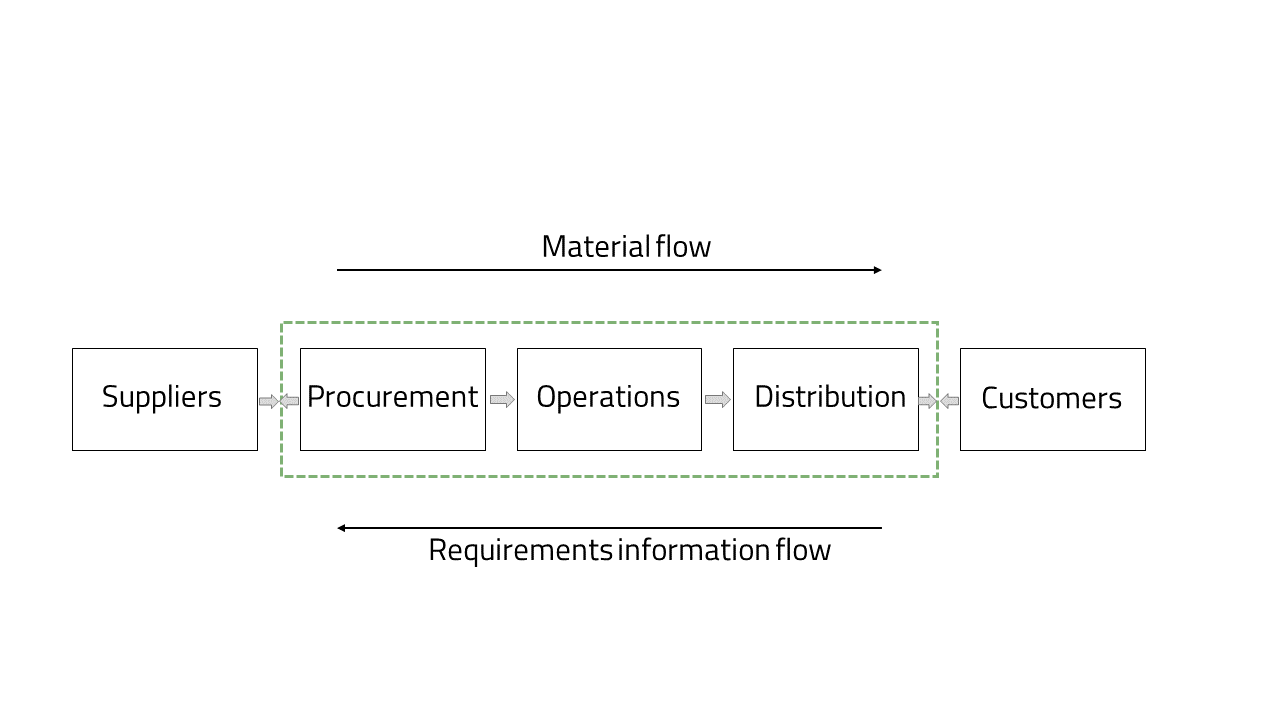Global Supply Chain and Logistics
Global Supply Chain and Logistics
Completion requirements
View
The topic “Global Supply Chain, Logistics and Sustainability” provides you with an overview of the topic cluster “Mobility of Goods and Logistics Systems” (MoGoLo) and its learning objectives. In all topics of this topic cluster we provide you with tools to understand and to design supply chains with as much sustainable standards in logistics as possible.
2. Basic definitions
To better understand the topics in MoGoLo, this page will provide you with some basic definitions for logistic relevant terms.
Transport chain
The DIN 30781 defines transport chains generally as a “... series of technically or organisationally linked procedures, in which persons or goods are moved from source to destination. The transport chain is to be understood as a system.”
Thus, international transport chains can be termed as definable sections in corporate comprehensive logistic chains across foreign countries.
Logistics
“Logistics is the process of strategically managing the procurement, movement and storage of materials, parts and finished inventory (and the related information flows) through the organisation and its marketing channels in such a way that current and future profitability are maximised through the cost-effective fulfilment of orders.” (Christopher 1998)
The figure "Logistics management process" shows the whole process including the different stages of the logistics management process (suppliers, procurement, operations, distribution, customers).

Thus, international logistics is related to the management of procurement, production and/or distribution in foreign countries (Christopher 1998).
Third party logistics:
Third party logistics:
Coyle et al. (2003, p. 425) define a third-party logistics provider as „an external supplier that performs all or part of a company‘s functions.“
“Lead logistics provider” is used for a third-party logistics provider, who has a single interface between the client and multiple logistics service providers.
From company logistics to supply chain management
Company logistics was based on integrating the processes of all the actors involved, after standardizing operating technologies to a certain degree. With corporate logistics, operating technologies still played a fundamental role and the flow optimization was aimed at achieving a single pipeline.
In the Supply chain management (SCM) the entire process is divided into segments, with each actor having a specific function and the main effort, even at the technology level, is focused on integrating the procedures of all actors.
The transition from company logistics to SCM was driven by the increase of outsourcing (third party logistic).
According to the definition of Council of Supply Chain Management Professionals (CSCMP), logistics management is that part of supply chain management that
• plans,
• implements,
• and controls
the efficient, effective forward and reverses flow and storage of goods, services and related information between the point of origin and the point of consumption in order to meet customers' requirements.
the efficient, effective forward and reverses flow and storage of goods, services and related information between the point of origin and the point of consumption in order to meet customers' requirements.
CSCMP’s boundaries and relationships of logistics management
Logistics management activities typically include
▪ inbound and outbound transportation management,
▪ fleet management,
▪ warehousing,
▪ materials handling,
▪ order fulfillment,
▪ logistics network design,
▪ inventory management,
▪ supply/demand planning, and
▪ management of third-party logistics services providers.
To varying degrees, the logistics function also includes sourcing and procurement, production planning and scheduling, packaging and assembly, and customer service. It is involved in all levels of planning and execution: strategic, tactical and operational.
Logistics management is an integrating function, which coordinates and optimizes all logistics activities, as well as integrates logistics activities with other functions including marketing, sales manufacturing, finance, and information technology.
Now you know the most important definitions for logistics.
Now you know the most important definitions for logistics.
Literature
- Christopher, M.(1998): Logistics and Supply Chain Management 2.Ed. p. 4, 13
- Coyle, J.J.; Bardi, E.J.; Langley, J.C. (2003): The management of Business Logistics: A Supply Chain Perspective. Canada.
- Thomsom South-Western CSCMP (Council of Supply Chain Management Professionals) (2021): CSCMP Supply Chain Management Definitions and Glossary. URL: https://cscmp.org/CSCMP/Academia/SCMDefinitionsandGlossaryofTerms/CSCMP/Educate/SCMDefinitionsandGlossaryofTerms.aspx?hkey=60879588-f65f-4ab5-8c4b-6878815ef921 (last access: 29.06.2021)